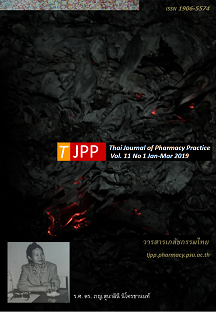ปัจจัยที่สัมพันธ์กับความกลัวภาวะน้ำตาลในเลือดต่ำ
Main Article Content
บทคัดย่อ
วัตถุประสงค์:เพื่อศึกษาปัจจัยที่สัมพันธ์กับความกลัวภาวะน้ำตาลในเลือดต่ำของผู้ป่วยเบาหวานชนิดที่ 2 วิธีการ : งานวิจัยนี้เป็นการศึกษาเชิงพรรณนาวิเคราะห์แบบภาคตัดขวาง โดยเก็บข้อมูลจากผู้ป่วยเบาหวานชนิดที่ 2 ที่มารับบริการอย่างต่อเนื่องในเครือข่ายบริการสุขภาพโรงพยาบาลเวียงป่าเป้า จังหวัดเชียงรายจำนวน 345 รายในช่วงเดือน มกราคม ถึง มิถุนายน พ.ศ.2559 เครื่องมือที่ใช้ประเมินความกลัวภาวะน้ำตาลในเลือดต่ำคือ Hypoglycemia Fear Survey–II (HFS–II) ฉบับภาษาไทย ซึ่งประกอบด้วยคำถามด้านพฤติกรรมและด้านความกังวล การศึกษาวิเคราะห์หาความสัมพันธ์ระหว่างปัจจัยต่าง ๆ กับความกลัวภาวะน้ำตาลในเลือดต่ำด้วยสถิติการถดถอยโลจิสติก ผลการวิจัย: ผู้ป่วยส่วนใหญ่เป็นเพศหญิง 226 ราย (ร้อยละ 65.5) อายุเฉลี่ย 58.7±8.7 ปี ค่าระดับน้ำตาลในเลือด (Fasting Plasma Glucose : FPG)เฉลี่ย140.2±44.4 มก./ดล. HbA1c เฉลี่ย 9.5±1.9% คะแนนเฉลี่ยของความกลัวภาวะน้ำตาลในเลือดด้านพฤติกรรมเท่ากับ 21.2±7.6 คะแนน จากคะแนนเต็ม 75 คะแนน และคะแนนเฉลี่ยด้านความกังวลเท่ากับ 24.9±9.3 คะแนน จากคะแนนเต็ม 90 คะแนน จากปัจจัยที่ศึกษาทั้งหมด 9 ปัจจัย ได้แก่ อายุ เพศ ระยะเวลาที่เป็นโรคเบาหวาน โรคร่วมหรือโรคแทรกซ้อน ประวัติการเข้ารักษาในโรงพยาบาลเนื่องจากโรคเบาหวาน การได้รับยาฉีดอินซูลิน 70/30 ระยะเวลาในการใช้ยาฉีดอินซูลิน 70/30 ประวัติการเกิดภาวะน้ำตาลในเลือดต่ำ และความเครียด พบปัจจัยที่มีความสัมพันธ์กับคะแนนความกลัวภาวะน้ำตาลในเลือดต่ำด้านพฤติกรรม คือ ประวัติการเกิดภาวะน้ำตาลในเลือดต่ำระดับปานกลางถึงรุนแรงเมื่อเทียบกับผู้ป่วยที่ไม่เคยเกิดภาวะน้ำตาลในเลือดต่ำ (OR = 2.75, P=0.002) ปัจจัยที่สัมพันธ์กับคะแนนความกลัวภาวะน้ำตาลในเลือดต่ำด้านความกังวล คือ ประวัติการเกิดภาวะน้ำตาลในเลือดต่ำระดับปานกลางถึงรุนแรงเมื่อเทียบกับผู้ป่วยที่ไม่เคยเกิดภาวะน้ำตาลในเลือดต่ำ(OR=1.99, P=0.019) และระดับความเครียด (OR=2.96, P=0.004)ปัจจัยที่สัมพันธ์กับคะแนนความกลัวภาวะน้ำตาลในเลือดต่ำโดยรวม คือ ประวัติการเกิดภาวะน้ำตาลในเลือดต่ำระดับปานกลางถึงรุนแรงเมื่อเทียบกับผู้ป่วยที่ไม่เคยเกิดภาวะน้ำตาลในเลือดต่ำ(OR=3.08, P=0.012) สรุป : ปัจจัยที่มีผลต่อความกลัวภาวะน้ำตาลในเลือดต่ำมี 2 ปัจจัยคือประวัติการเกิดภาวะน้ำตาลในเลือดต่ำและความเครียด การให้ความรู้ความเข้าในเรื่องภาวะน้ำตาลในเลือดต่ำโดยเฉพาะผู้ป่วยที่มีประวัติการเกิดภาวะน้ำตาลในเลือดต่ำและผู้ป่วยที่มีความเครียดเป็นสิ่งจำเป็นที่อาจช่วยลดความกลัวภาวะน้ำตาลในเลือดต่ำได้
Article Details
ผลการวิจัยและความคิดเห็นที่ปรากฏในบทความถือเป็นความคิดเห็นและอยู่ในความรับผิดชอบของผู้นิพนธ์ มิใช่ความเห็นหรือความรับผิดชอบของกองบรรณาธิการ หรือคณะเภสัชศาสตร์ มหาวิทยาลัยสงขลานครินทร์ ทั้งนี้ไม่รวมความผิดพลาดอันเกิดจากการพิมพ์ บทความที่ได้รับการเผยแพร่โดยวารสารเภสัชกรรมไทยถือเป็นสิทธิ์ของวารสารฯ
เอกสารอ้างอิง
2. World Health Organization. Global report on diabetes [online]. 2016 [cited March, 22 2017]. Available from: www.who.int/diabetes/publications/ grd-2016/en/.
3. Guariguata L, Whiting DR, Hambleton I, Beagley J, Linnenkamp U, Shaw JE. Global estimates of diabetes prevalence for 2013 and projections for 2035. Diabetes Res Clin Pract. 2014;103:137-49.
4. International Diabetes Federation (IDF). IDF Diabetes Atlas 2013 [online] 2013 [cited Aug 1, 2016]. Available from: www.idf.org/diabetesatlas.
5. Bureau of Non Communicable Disease, Depart- ment of Disease Control, Ministry of Public Health. Annual report 2015 [online] 2015 [cited Mar 4, 2017]. Available from: www.thaincd.com/document /file/download/paper-manual/Annual-report-2015 .pdf
6. Bureau of Non Communicable Disease, Department of Disease Control, Ministry of Public Health. Annual report 2016 [online] 2016 [cited Oct 10, 2017]. Available from: www.thaincd.com/ document/file/download/paper-manual.
7. Rangsin R, et al. An assessment on quality of care among patients diagnosed with type 2 diabetes and hypertension visiting hospitals in care of Ministry of Public Health and hospitals in Bangkok in Thailand 2015. National Health Security Office 2015.
8. ACCORD (Action to Control Cardiovascular Risk in Diabetes Study Group). Effects of intensive glucose lowering in type 2 diabetes. N Engl J Med. 2008;358;24:2545-59.
9. Oyer DS. The science of hypoglycemia in patients with diabetes. Curr Diab Rep. 2013; 9 195-208.
10. Amiel SA, Dixon T, Mann R, Jameson K. Hypoglycaemia in type 2 diabetes. Diabe med. 2008; 25 : 245-54.
11. Ly TT, Maahs DM, Rewers A, Dunger D, Oduwole A, Jones TW. ISPAD Clinical practice consensus guidelines–hypoglycemia: assessment and management of hypoglycemia in children and adolescents with diabetes. PEDI. 2014;15 (Suppl. 20):180-92.
12. Fidler C, Elmelund Christensen T, Gillard S. Hypo- glycemia: an overview of fear of hypoglycemia, quality-of-life, and impact on costs. J Med Econ. 2011;14: 646-55.
13. Gjerlow E, Bjorgaas MR, Nielsen EW, Olsen SE, Asvold BO. Fear of hypoglycemia in women and men with type 1 diabetes. Nursing Research. 2014 ; 63 :143-9.
14. Gonder-Frederick LA, Schmidt KM, Vajda KA, Greear ML, Singh H, Shepard JA, et al. Psychometric properties of the hypoglycemia fear survey-ii for adults with type 1 diabetes. Diabetes Care. 2011;34 : 801-6.
15. Leiter LA, Yale J-F, Chiasson J-L, Harris S, Kleinstiver P, Sauriol L. Assessment of the Impact of fear of hypoglycemic episodes on glycemic and hypoglycemia management. CJD. 2005; 29:1-7.
16. Polonsky WH, Davis CL, Jacobson AM, Anderson BJ. Correlates of hypoglycemic fear in type I and type II diabetes mellitus. Health psychol 1992; 11: 199-202.
17. Sakwattakamchon R. The effects of hypoglycemic management program on self-care and fear of hypoglycemia in persons with type 2 diabetes. [master thesis]. Burapha University; 2013.
18. Thonthan S. Factors related to hypoglycemic management in person with type 2 diabetes [master thesis]. Burapha University; 2014.
19. Yamane T. Statistics: An introductory analysis: Harper and Row; 1973.
20. Cox DJ, Irvine A, Gonder-Frederick L, Nowacek G, Butterfield J. Fear of hypoglycemia: quantification, validation, and utilization. Diabetes Care. 1987; 10:617-21.
21. Vanichbuncha K. SPSS for Windows. Samlada, Bangkok; 2015.
22. Department of Mental Health, Ministry of Public Health. ST5 [online] 2014. [cited Oct 5, 2015]; Available from: www.dmh.go.th/test/qtest5/.
23. Sheu WH, Ji LN, Nitiyanant W, Baik SH, Yin D, Mavros P, et al. Hypoglycemia is associated with increased worry and lower quality of life among patients with type 2 diabetes treated with oral antihyperglycemic agents in the Asia-Pacific region. Diabetes Res Clin Pract. 2012;96:141-8.
24. Stargardt T, Gonder-Frederick L, Krobot KJ, Alexander CM. Fear of hypoglycaemia: defining a minimum clinically important difference in patients with type 2 diabetes. Health Qual Life Outcomes [online]. 2009. [cited Oct 22, 2015]; Available from: www.ncbi.nlm.nih.gov/pubmed/19849828.
25. Hajos TR, Polonsky WH, Pouwer F, Gonder-Frederick L, Snoek FJ. Toward defining a cutoff score for elevated fear of hypoglycemia on the hypoglycemia fear survey worry subscale in patients with type 2 diabetes. Diabetes Care. 2014 ; 37:102-8.
26. Shi. L, Shao. H, Zhao. Y, Thomas. NA. Is hypoglycemia fear independently associated with health-related quality of life? [online] 2014. [cited Jul 27, 2016]; Available from: www.hqlo.com/con tent/pdf/s12955-014-0167-3.pdf.
27. Irvine AA, Cox D, Gonder-Frederick L. Fear of hypoglycemia: relationship to physical and psycho- logical symptoms in patients with insulin-dependent diabetes mellitus. Health psychol 1992; 11:135-8.
28. Diabetes Assicuation of Thailand. Clinical practice guideline for diabetes 2014 [online] 2014 [cited Mar 2, 2016]. Available from: www.nhso.go.th/front end/page-forhospital_cpg.aspx.


